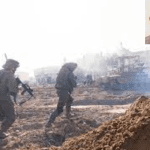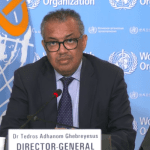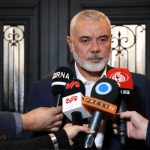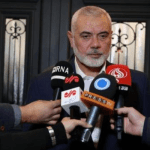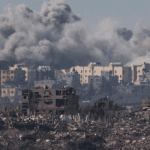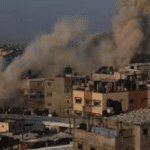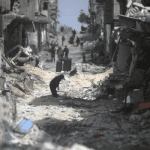Keynote speakers at the Cairo Peace Summit, which took place today, Saturday, October 21 in Cairo, the capital of Egypt, pledged their support for the Palestinian people’s inalienable rights and the need for an immediate ceasefire in Gaza in order to stop Israel’s crimes against the civilian population of the Palestinian territories.
Arab leaders referred to Israel’s retaliatory strikes on Gaza as “collective punishment” and emphasized that a two-state solution is the cornerstone of any stable and secure resolution to the Israel-Palestinian conflict.
In his opening remarks before the summit, President Abdel-Fattah El-Sisi reaffirmed Egypt’s unwavering support for the Palestinian cause, and suggested a roadmap to end the current humanitarian crisis in Gaza and revive the path of peace.
He criticized inequality and double standards in dealing with human life losses.
The Egyptian president, who called for the summit that is attended by leaders from more than a dozen Arab and Western countries and representatives of the European Union and various international organizations, reiterated that Cairo categorically rejects the displacement of the Palestinians from their land under any circumstances.
He stressed that “the liquidation of the Palestinian cause without a just solution is beyond the realm of possibility, and in all cases, it will never happen at the expense of Egypt”.
El-Sisi emphasised the need to prevent the conflict from escalating further and jeopardizing regional stability and global peace and security. He extended an invitation to work collectively on a specific roadmap.
Speaking, Jordan’s King Abdullah denounced what he termed global silence about Israel’s attacks on the enclave and urged an even-handed approach to the Israeli-Palestinian dispute.
The Jordanian King reiterated his call for an immediate end to the war on Gaza, the protection of civilians, and the adoption of a unified position that indiscriminately condemns the targeting of all civilians, “in line with our shared values and international law, which loses all value if it is implemented selectively.”
He stressed the need for sustained and uninterrupted delivery of humanitarian aid, fuel, food, and medicine to the Gaza Strip.
King Abdullah also reaffirmed the unequivocal rejection of the forced displacement or internal displacement of the Palestinians, describing that as a war crime according to international law, “and a red line for all of us”.
South Africa calls for fulfillment of legitimate aspirations of the Palestinian people
South African President Cyril Ramaphosa expressed his rejection of civilian casualties, the blockade imposed on Gaza, forced displacement and dispossession, bombings, and infrastructure destruction, as well as waves of violence that violate international law.
He pointed out that the international community has a duty and responsibility to support the peace process and create favorable conditions and dialogue avenues.
Ramaphosa also placed responsibility on the Israeli government to work on calming the prolonged conflict and achieving peace, expressing his concern that this conflict could spread and escalate beyond control to involve several countries.
He stressed that the only way to achieve peace is to fulfill the legitimate aspirations of the Palestinian people regarding human rights, in line with United Nations resolutions ensuring a two-state solution based on the 1967 borders.
Bahrain’s King Hamad bin Isa Al Khalifa affirmed his country’s steadfast support for the legitimate rights of the Palestinian people, including the establishment of an independent, sovereign state within the 1967 borders with East Jerusalem as its capital, in accordance with the two-state solution and United Nations resolutions.
He stated that the two-state solution is a real guarantee for coexistence in safety and peace, saying there will be no stability in the Middle East without securing the legitimate rights of our Palestinian brethren and reaching a just, comprehensive, and sustainable peace in the region.
Bahrain’s monarch added that the kingdom has chosen its strategic option for peace to achieve more security and stability in light of its peace-seeking approach, commitment to dialogue, and the peaceful path as the only means of conflict resolution, ensuring security, development, and prosperity for all the region’s peoples.
Addressing the summit, UN Secretary General Antonio Guterres pleaded for a “humanitarian ceasefire” in the Israeli aggression on Gaza, demanding global “action to end this godawful nightmare”.
Guterres said the tiny Palestinian enclave of 2.4 million people was living through “a humanitarian catastrophe” with thousands dead and more than a million people displaced.
His remarks came just hours after a first contingent of aid trucks rumbled into southern Gaza, which Guterres said needed to be rapidly scaled up, with “much more” help sent through.
The Palestinians need “a continuous delivery of aid to Gaza at the scale that is needed”, he told the Cairo “Summit for Peace” which was attended by many Arab leaders.
“The Gazans need much more, a massive delivery of aid is necessary” added the Secretary General of the United Nations.
Keynote speakers at the Cairo Peace Summit, which took place today, Saturday, October 21 in Cairo, the capital of Egypt, pledged their support for the Palestinian people’s inalienable rights and the need for an immediate ceasefire in Gaza in order to stop Israel’s crimes against the civilian population of the Palestinian territories.
Arab leaders referred to Israel’s retaliatory strikes on Gaza as “collective punishment” and emphasized that a two-state solution is the cornerstone of any stable and secure resolution to the Israel-Palestinian conflict.
In his opening remarks before the summit, President Abdel-Fattah El-Sisi reaffirmed Egypt’s unwavering support for the Palestinian cause, and suggested a roadmap to end the current humanitarian crisis in Gaza and revive the path of peace.
He criticized inequality and double standards in dealing with human life losses.
The Egyptian president, who called for the summit that is attended by leaders from more than a dozen Arab and Western countries and representatives of the European Union and various international organizations, reiterated that Cairo categorically rejects the displacement of the Palestinians from their land under any circumstances.
He stressed that “the liquidation of the Palestinian cause without a just solution is beyond the realm of possibility, and in all cases, it will never happen at the expense of Egypt”.
El-Sisi emphasised the need to prevent the conflict from escalating further and jeopardizing regional stability and global peace and security. He extended an invitation to work collectively on a specific roadmap.
Speaking, Jordan’s King Abdullah denounced what he termed global silence about Israel’s attacks on the enclave and urged an even-handed approach to the Israeli-Palestinian dispute.
The Jordanian King reiterated his call for an immediate end to the war on Gaza, the protection of civilians, and the adoption of a unified position that indiscriminately condemns the targeting of all civilians, “in line with our shared values and international law, which loses all value if it is implemented selectively.”
He stressed the need for sustained and uninterrupted delivery of humanitarian aid, fuel, food, and medicine to the Gaza Strip.
King Abdullah also reaffirmed the unequivocal rejection of the forced displacement or internal displacement of the Palestinians, describing that as a war crime according to international law, “and a red line for all of us”.
South Africa calls for fulfillment of legitimate aspirations of the Palestinian people
South African President Cyril Ramaphosa expressed his rejection of civilian casualties, the blockade imposed on Gaza, forced displacement and dispossession, bombings, and infrastructure destruction, as well as waves of violence that violate international law.
He pointed out that the international community has a duty and responsibility to support the peace process and create favorable conditions and dialogue avenues.
Ramaphosa also placed responsibility on the Israeli government to work on calming the prolonged conflict and achieving peace, expressing his concern that this conflict could spread and escalate beyond control to involve several countries.
He stressed that the only way to achieve peace is to fulfill the legitimate aspirations of the Palestinian people regarding human rights, in line with United Nations resolutions ensuring a two-state solution based on the 1967 borders.
Bahrain’s King Hamad bin Isa Al Khalifa affirmed his country’s steadfast support for the legitimate rights of the Palestinian people, including the establishment of an independent, sovereign state within the 1967 borders with East Jerusalem as its capital, in accordance with the two-state solution and United Nations resolutions.
He stated that the two-state solution is a real guarantee for coexistence in safety and peace, saying there will be no stability in the Middle East without securing the legitimate rights of our Palestinian brethren and reaching a just, comprehensive, and sustainable peace in the region.
Bahrain’s monarch added that the kingdom has chosen its strategic option for peace to achieve more security and stability in light of its peace-seeking approach, commitment to dialogue, and the peaceful path as the only means of conflict resolution, ensuring security, development, and prosperity for all the region’s peoples.
Addressing the summit, UN Secretary General Antonio Guterres pleaded for a “humanitarian ceasefire” in the Israeli aggression on Gaza, demanding global “action to end this godawful nightmare”.
Guterres said the tiny Palestinian enclave of 2.4 million people was living through “a humanitarian catastrophe” with thousands dead and more than a million people displaced.
His remarks came just hours after a first contingent of aid trucks rumbled into southern Gaza, which Guterres said needed to be rapidly scaled up, with “much more” help sent through.
The Palestinians need “a continuous delivery of aid to Gaza at the scale that is needed”, he told the Cairo “Summit for Peace” which was attended by many Arab leaders.
“The Gazans need much more, a massive delivery of aid is necessary” added the Secretary General of the United Nations.
Keynote speakers at the Cairo Peace Summit, which took place today, Saturday, October 21 in Cairo, the capital of Egypt, pledged their support for the Palestinian people’s inalienable rights and the need for an immediate ceasefire in Gaza in order to stop Israel’s crimes against the civilian population of the Palestinian territories.
Arab leaders referred to Israel’s retaliatory strikes on Gaza as “collective punishment” and emphasized that a two-state solution is the cornerstone of any stable and secure resolution to the Israel-Palestinian conflict.
In his opening remarks before the summit, President Abdel-Fattah El-Sisi reaffirmed Egypt’s unwavering support for the Palestinian cause, and suggested a roadmap to end the current humanitarian crisis in Gaza and revive the path of peace.
He criticized inequality and double standards in dealing with human life losses.
The Egyptian president, who called for the summit that is attended by leaders from more than a dozen Arab and Western countries and representatives of the European Union and various international organizations, reiterated that Cairo categorically rejects the displacement of the Palestinians from their land under any circumstances.
He stressed that “the liquidation of the Palestinian cause without a just solution is beyond the realm of possibility, and in all cases, it will never happen at the expense of Egypt”.
El-Sisi emphasised the need to prevent the conflict from escalating further and jeopardizing regional stability and global peace and security. He extended an invitation to work collectively on a specific roadmap.
Speaking, Jordan’s King Abdullah denounced what he termed global silence about Israel’s attacks on the enclave and urged an even-handed approach to the Israeli-Palestinian dispute.
The Jordanian King reiterated his call for an immediate end to the war on Gaza, the protection of civilians, and the adoption of a unified position that indiscriminately condemns the targeting of all civilians, “in line with our shared values and international law, which loses all value if it is implemented selectively.”
He stressed the need for sustained and uninterrupted delivery of humanitarian aid, fuel, food, and medicine to the Gaza Strip.
King Abdullah also reaffirmed the unequivocal rejection of the forced displacement or internal displacement of the Palestinians, describing that as a war crime according to international law, “and a red line for all of us”.
South Africa calls for fulfillment of legitimate aspirations of the Palestinian people
South African President Cyril Ramaphosa expressed his rejection of civilian casualties, the blockade imposed on Gaza, forced displacement and dispossession, bombings, and infrastructure destruction, as well as waves of violence that violate international law.
He pointed out that the international community has a duty and responsibility to support the peace process and create favorable conditions and dialogue avenues.
Ramaphosa also placed responsibility on the Israeli government to work on calming the prolonged conflict and achieving peace, expressing his concern that this conflict could spread and escalate beyond control to involve several countries.
He stressed that the only way to achieve peace is to fulfill the legitimate aspirations of the Palestinian people regarding human rights, in line with United Nations resolutions ensuring a two-state solution based on the 1967 borders.
Bahrain’s King Hamad bin Isa Al Khalifa affirmed his country’s steadfast support for the legitimate rights of the Palestinian people, including the establishment of an independent, sovereign state within the 1967 borders with East Jerusalem as its capital, in accordance with the two-state solution and United Nations resolutions.
He stated that the two-state solution is a real guarantee for coexistence in safety and peace, saying there will be no stability in the Middle East without securing the legitimate rights of our Palestinian brethren and reaching a just, comprehensive, and sustainable peace in the region.
Bahrain’s monarch added that the kingdom has chosen its strategic option for peace to achieve more security and stability in light of its peace-seeking approach, commitment to dialogue, and the peaceful path as the only means of conflict resolution, ensuring security, development, and prosperity for all the region’s peoples.
Addressing the summit, UN Secretary General Antonio Guterres pleaded for a “humanitarian ceasefire” in the Israeli aggression on Gaza, demanding global “action to end this godawful nightmare”.
Guterres said the tiny Palestinian enclave of 2.4 million people was living through “a humanitarian catastrophe” with thousands dead and more than a million people displaced.
His remarks came just hours after a first contingent of aid trucks rumbled into southern Gaza, which Guterres said needed to be rapidly scaled up, with “much more” help sent through.
The Palestinians need “a continuous delivery of aid to Gaza at the scale that is needed”, he told the Cairo “Summit for Peace” which was attended by many Arab leaders.
“The Gazans need much more, a massive delivery of aid is necessary” added the Secretary General of the United Nations.
Keynote speakers at the Cairo Peace Summit, which took place today, Saturday, October 21 in Cairo, the capital of Egypt, pledged their support for the Palestinian people’s inalienable rights and the need for an immediate ceasefire in Gaza in order to stop Israel’s crimes against the civilian population of the Palestinian territories.
Arab leaders referred to Israel’s retaliatory strikes on Gaza as “collective punishment” and emphasized that a two-state solution is the cornerstone of any stable and secure resolution to the Israel-Palestinian conflict.
In his opening remarks before the summit, President Abdel-Fattah El-Sisi reaffirmed Egypt’s unwavering support for the Palestinian cause, and suggested a roadmap to end the current humanitarian crisis in Gaza and revive the path of peace.
He criticized inequality and double standards in dealing with human life losses.
The Egyptian president, who called for the summit that is attended by leaders from more than a dozen Arab and Western countries and representatives of the European Union and various international organizations, reiterated that Cairo categorically rejects the displacement of the Palestinians from their land under any circumstances.
He stressed that “the liquidation of the Palestinian cause without a just solution is beyond the realm of possibility, and in all cases, it will never happen at the expense of Egypt”.
El-Sisi emphasised the need to prevent the conflict from escalating further and jeopardizing regional stability and global peace and security. He extended an invitation to work collectively on a specific roadmap.
Speaking, Jordan’s King Abdullah denounced what he termed global silence about Israel’s attacks on the enclave and urged an even-handed approach to the Israeli-Palestinian dispute.
The Jordanian King reiterated his call for an immediate end to the war on Gaza, the protection of civilians, and the adoption of a unified position that indiscriminately condemns the targeting of all civilians, “in line with our shared values and international law, which loses all value if it is implemented selectively.”
He stressed the need for sustained and uninterrupted delivery of humanitarian aid, fuel, food, and medicine to the Gaza Strip.
King Abdullah also reaffirmed the unequivocal rejection of the forced displacement or internal displacement of the Palestinians, describing that as a war crime according to international law, “and a red line for all of us”.
South Africa calls for fulfillment of legitimate aspirations of the Palestinian people
South African President Cyril Ramaphosa expressed his rejection of civilian casualties, the blockade imposed on Gaza, forced displacement and dispossession, bombings, and infrastructure destruction, as well as waves of violence that violate international law.
He pointed out that the international community has a duty and responsibility to support the peace process and create favorable conditions and dialogue avenues.
Ramaphosa also placed responsibility on the Israeli government to work on calming the prolonged conflict and achieving peace, expressing his concern that this conflict could spread and escalate beyond control to involve several countries.
He stressed that the only way to achieve peace is to fulfill the legitimate aspirations of the Palestinian people regarding human rights, in line with United Nations resolutions ensuring a two-state solution based on the 1967 borders.
Bahrain’s King Hamad bin Isa Al Khalifa affirmed his country’s steadfast support for the legitimate rights of the Palestinian people, including the establishment of an independent, sovereign state within the 1967 borders with East Jerusalem as its capital, in accordance with the two-state solution and United Nations resolutions.
He stated that the two-state solution is a real guarantee for coexistence in safety and peace, saying there will be no stability in the Middle East without securing the legitimate rights of our Palestinian brethren and reaching a just, comprehensive, and sustainable peace in the region.
Bahrain’s monarch added that the kingdom has chosen its strategic option for peace to achieve more security and stability in light of its peace-seeking approach, commitment to dialogue, and the peaceful path as the only means of conflict resolution, ensuring security, development, and prosperity for all the region’s peoples.
Addressing the summit, UN Secretary General Antonio Guterres pleaded for a “humanitarian ceasefire” in the Israeli aggression on Gaza, demanding global “action to end this godawful nightmare”.
Guterres said the tiny Palestinian enclave of 2.4 million people was living through “a humanitarian catastrophe” with thousands dead and more than a million people displaced.
His remarks came just hours after a first contingent of aid trucks rumbled into southern Gaza, which Guterres said needed to be rapidly scaled up, with “much more” help sent through.
The Palestinians need “a continuous delivery of aid to Gaza at the scale that is needed”, he told the Cairo “Summit for Peace” which was attended by many Arab leaders.
“The Gazans need much more, a massive delivery of aid is necessary” added the Secretary General of the United Nations.
Keynote speakers at the Cairo Peace Summit, which took place today, Saturday, October 21 in Cairo, the capital of Egypt, pledged their support for the Palestinian people’s inalienable rights and the need for an immediate ceasefire in Gaza in order to stop Israel’s crimes against the civilian population of the Palestinian territories.
Arab leaders referred to Israel’s retaliatory strikes on Gaza as “collective punishment” and emphasized that a two-state solution is the cornerstone of any stable and secure resolution to the Israel-Palestinian conflict.
In his opening remarks before the summit, President Abdel-Fattah El-Sisi reaffirmed Egypt’s unwavering support for the Palestinian cause, and suggested a roadmap to end the current humanitarian crisis in Gaza and revive the path of peace.
He criticized inequality and double standards in dealing with human life losses.
The Egyptian president, who called for the summit that is attended by leaders from more than a dozen Arab and Western countries and representatives of the European Union and various international organizations, reiterated that Cairo categorically rejects the displacement of the Palestinians from their land under any circumstances.
He stressed that “the liquidation of the Palestinian cause without a just solution is beyond the realm of possibility, and in all cases, it will never happen at the expense of Egypt”.
El-Sisi emphasised the need to prevent the conflict from escalating further and jeopardizing regional stability and global peace and security. He extended an invitation to work collectively on a specific roadmap.
Speaking, Jordan’s King Abdullah denounced what he termed global silence about Israel’s attacks on the enclave and urged an even-handed approach to the Israeli-Palestinian dispute.
The Jordanian King reiterated his call for an immediate end to the war on Gaza, the protection of civilians, and the adoption of a unified position that indiscriminately condemns the targeting of all civilians, “in line with our shared values and international law, which loses all value if it is implemented selectively.”
He stressed the need for sustained and uninterrupted delivery of humanitarian aid, fuel, food, and medicine to the Gaza Strip.
King Abdullah also reaffirmed the unequivocal rejection of the forced displacement or internal displacement of the Palestinians, describing that as a war crime according to international law, “and a red line for all of us”.
South Africa calls for fulfillment of legitimate aspirations of the Palestinian people
South African President Cyril Ramaphosa expressed his rejection of civilian casualties, the blockade imposed on Gaza, forced displacement and dispossession, bombings, and infrastructure destruction, as well as waves of violence that violate international law.
He pointed out that the international community has a duty and responsibility to support the peace process and create favorable conditions and dialogue avenues.
Ramaphosa also placed responsibility on the Israeli government to work on calming the prolonged conflict and achieving peace, expressing his concern that this conflict could spread and escalate beyond control to involve several countries.
He stressed that the only way to achieve peace is to fulfill the legitimate aspirations of the Palestinian people regarding human rights, in line with United Nations resolutions ensuring a two-state solution based on the 1967 borders.
Bahrain’s King Hamad bin Isa Al Khalifa affirmed his country’s steadfast support for the legitimate rights of the Palestinian people, including the establishment of an independent, sovereign state within the 1967 borders with East Jerusalem as its capital, in accordance with the two-state solution and United Nations resolutions.
He stated that the two-state solution is a real guarantee for coexistence in safety and peace, saying there will be no stability in the Middle East without securing the legitimate rights of our Palestinian brethren and reaching a just, comprehensive, and sustainable peace in the region.
Bahrain’s monarch added that the kingdom has chosen its strategic option for peace to achieve more security and stability in light of its peace-seeking approach, commitment to dialogue, and the peaceful path as the only means of conflict resolution, ensuring security, development, and prosperity for all the region’s peoples.
Addressing the summit, UN Secretary General Antonio Guterres pleaded for a “humanitarian ceasefire” in the Israeli aggression on Gaza, demanding global “action to end this godawful nightmare”.
Guterres said the tiny Palestinian enclave of 2.4 million people was living through “a humanitarian catastrophe” with thousands dead and more than a million people displaced.
His remarks came just hours after a first contingent of aid trucks rumbled into southern Gaza, which Guterres said needed to be rapidly scaled up, with “much more” help sent through.
The Palestinians need “a continuous delivery of aid to Gaza at the scale that is needed”, he told the Cairo “Summit for Peace” which was attended by many Arab leaders.
“The Gazans need much more, a massive delivery of aid is necessary” added the Secretary General of the United Nations.
Keynote speakers at the Cairo Peace Summit, which took place today, Saturday, October 21 in Cairo, the capital of Egypt, pledged their support for the Palestinian people’s inalienable rights and the need for an immediate ceasefire in Gaza in order to stop Israel’s crimes against the civilian population of the Palestinian territories.
Arab leaders referred to Israel’s retaliatory strikes on Gaza as “collective punishment” and emphasized that a two-state solution is the cornerstone of any stable and secure resolution to the Israel-Palestinian conflict.
In his opening remarks before the summit, President Abdel-Fattah El-Sisi reaffirmed Egypt’s unwavering support for the Palestinian cause, and suggested a roadmap to end the current humanitarian crisis in Gaza and revive the path of peace.
He criticized inequality and double standards in dealing with human life losses.
The Egyptian president, who called for the summit that is attended by leaders from more than a dozen Arab and Western countries and representatives of the European Union and various international organizations, reiterated that Cairo categorically rejects the displacement of the Palestinians from their land under any circumstances.
He stressed that “the liquidation of the Palestinian cause without a just solution is beyond the realm of possibility, and in all cases, it will never happen at the expense of Egypt”.
El-Sisi emphasised the need to prevent the conflict from escalating further and jeopardizing regional stability and global peace and security. He extended an invitation to work collectively on a specific roadmap.
Speaking, Jordan’s King Abdullah denounced what he termed global silence about Israel’s attacks on the enclave and urged an even-handed approach to the Israeli-Palestinian dispute.
The Jordanian King reiterated his call for an immediate end to the war on Gaza, the protection of civilians, and the adoption of a unified position that indiscriminately condemns the targeting of all civilians, “in line with our shared values and international law, which loses all value if it is implemented selectively.”
He stressed the need for sustained and uninterrupted delivery of humanitarian aid, fuel, food, and medicine to the Gaza Strip.
King Abdullah also reaffirmed the unequivocal rejection of the forced displacement or internal displacement of the Palestinians, describing that as a war crime according to international law, “and a red line for all of us”.
South Africa calls for fulfillment of legitimate aspirations of the Palestinian people
South African President Cyril Ramaphosa expressed his rejection of civilian casualties, the blockade imposed on Gaza, forced displacement and dispossession, bombings, and infrastructure destruction, as well as waves of violence that violate international law.
He pointed out that the international community has a duty and responsibility to support the peace process and create favorable conditions and dialogue avenues.
Ramaphosa also placed responsibility on the Israeli government to work on calming the prolonged conflict and achieving peace, expressing his concern that this conflict could spread and escalate beyond control to involve several countries.
He stressed that the only way to achieve peace is to fulfill the legitimate aspirations of the Palestinian people regarding human rights, in line with United Nations resolutions ensuring a two-state solution based on the 1967 borders.
Bahrain’s King Hamad bin Isa Al Khalifa affirmed his country’s steadfast support for the legitimate rights of the Palestinian people, including the establishment of an independent, sovereign state within the 1967 borders with East Jerusalem as its capital, in accordance with the two-state solution and United Nations resolutions.
He stated that the two-state solution is a real guarantee for coexistence in safety and peace, saying there will be no stability in the Middle East without securing the legitimate rights of our Palestinian brethren and reaching a just, comprehensive, and sustainable peace in the region.
Bahrain’s monarch added that the kingdom has chosen its strategic option for peace to achieve more security and stability in light of its peace-seeking approach, commitment to dialogue, and the peaceful path as the only means of conflict resolution, ensuring security, development, and prosperity for all the region’s peoples.
Addressing the summit, UN Secretary General Antonio Guterres pleaded for a “humanitarian ceasefire” in the Israeli aggression on Gaza, demanding global “action to end this godawful nightmare”.
Guterres said the tiny Palestinian enclave of 2.4 million people was living through “a humanitarian catastrophe” with thousands dead and more than a million people displaced.
His remarks came just hours after a first contingent of aid trucks rumbled into southern Gaza, which Guterres said needed to be rapidly scaled up, with “much more” help sent through.
The Palestinians need “a continuous delivery of aid to Gaza at the scale that is needed”, he told the Cairo “Summit for Peace” which was attended by many Arab leaders.
“The Gazans need much more, a massive delivery of aid is necessary” added the Secretary General of the United Nations.
Keynote speakers at the Cairo Peace Summit, which took place today, Saturday, October 21 in Cairo, the capital of Egypt, pledged their support for the Palestinian people’s inalienable rights and the need for an immediate ceasefire in Gaza in order to stop Israel’s crimes against the civilian population of the Palestinian territories.
Arab leaders referred to Israel’s retaliatory strikes on Gaza as “collective punishment” and emphasized that a two-state solution is the cornerstone of any stable and secure resolution to the Israel-Palestinian conflict.
In his opening remarks before the summit, President Abdel-Fattah El-Sisi reaffirmed Egypt’s unwavering support for the Palestinian cause, and suggested a roadmap to end the current humanitarian crisis in Gaza and revive the path of peace.
He criticized inequality and double standards in dealing with human life losses.
The Egyptian president, who called for the summit that is attended by leaders from more than a dozen Arab and Western countries and representatives of the European Union and various international organizations, reiterated that Cairo categorically rejects the displacement of the Palestinians from their land under any circumstances.
He stressed that “the liquidation of the Palestinian cause without a just solution is beyond the realm of possibility, and in all cases, it will never happen at the expense of Egypt”.
El-Sisi emphasised the need to prevent the conflict from escalating further and jeopardizing regional stability and global peace and security. He extended an invitation to work collectively on a specific roadmap.
Speaking, Jordan’s King Abdullah denounced what he termed global silence about Israel’s attacks on the enclave and urged an even-handed approach to the Israeli-Palestinian dispute.
The Jordanian King reiterated his call for an immediate end to the war on Gaza, the protection of civilians, and the adoption of a unified position that indiscriminately condemns the targeting of all civilians, “in line with our shared values and international law, which loses all value if it is implemented selectively.”
He stressed the need for sustained and uninterrupted delivery of humanitarian aid, fuel, food, and medicine to the Gaza Strip.
King Abdullah also reaffirmed the unequivocal rejection of the forced displacement or internal displacement of the Palestinians, describing that as a war crime according to international law, “and a red line for all of us”.
South Africa calls for fulfillment of legitimate aspirations of the Palestinian people
South African President Cyril Ramaphosa expressed his rejection of civilian casualties, the blockade imposed on Gaza, forced displacement and dispossession, bombings, and infrastructure destruction, as well as waves of violence that violate international law.
He pointed out that the international community has a duty and responsibility to support the peace process and create favorable conditions and dialogue avenues.
Ramaphosa also placed responsibility on the Israeli government to work on calming the prolonged conflict and achieving peace, expressing his concern that this conflict could spread and escalate beyond control to involve several countries.
He stressed that the only way to achieve peace is to fulfill the legitimate aspirations of the Palestinian people regarding human rights, in line with United Nations resolutions ensuring a two-state solution based on the 1967 borders.
Bahrain’s King Hamad bin Isa Al Khalifa affirmed his country’s steadfast support for the legitimate rights of the Palestinian people, including the establishment of an independent, sovereign state within the 1967 borders with East Jerusalem as its capital, in accordance with the two-state solution and United Nations resolutions.
He stated that the two-state solution is a real guarantee for coexistence in safety and peace, saying there will be no stability in the Middle East without securing the legitimate rights of our Palestinian brethren and reaching a just, comprehensive, and sustainable peace in the region.
Bahrain’s monarch added that the kingdom has chosen its strategic option for peace to achieve more security and stability in light of its peace-seeking approach, commitment to dialogue, and the peaceful path as the only means of conflict resolution, ensuring security, development, and prosperity for all the region’s peoples.
Addressing the summit, UN Secretary General Antonio Guterres pleaded for a “humanitarian ceasefire” in the Israeli aggression on Gaza, demanding global “action to end this godawful nightmare”.
Guterres said the tiny Palestinian enclave of 2.4 million people was living through “a humanitarian catastrophe” with thousands dead and more than a million people displaced.
His remarks came just hours after a first contingent of aid trucks rumbled into southern Gaza, which Guterres said needed to be rapidly scaled up, with “much more” help sent through.
The Palestinians need “a continuous delivery of aid to Gaza at the scale that is needed”, he told the Cairo “Summit for Peace” which was attended by many Arab leaders.
“The Gazans need much more, a massive delivery of aid is necessary” added the Secretary General of the United Nations.
Keynote speakers at the Cairo Peace Summit, which took place today, Saturday, October 21 in Cairo, the capital of Egypt, pledged their support for the Palestinian people’s inalienable rights and the need for an immediate ceasefire in Gaza in order to stop Israel’s crimes against the civilian population of the Palestinian territories.
Arab leaders referred to Israel’s retaliatory strikes on Gaza as “collective punishment” and emphasized that a two-state solution is the cornerstone of any stable and secure resolution to the Israel-Palestinian conflict.
In his opening remarks before the summit, President Abdel-Fattah El-Sisi reaffirmed Egypt’s unwavering support for the Palestinian cause, and suggested a roadmap to end the current humanitarian crisis in Gaza and revive the path of peace.
He criticized inequality and double standards in dealing with human life losses.
The Egyptian president, who called for the summit that is attended by leaders from more than a dozen Arab and Western countries and representatives of the European Union and various international organizations, reiterated that Cairo categorically rejects the displacement of the Palestinians from their land under any circumstances.
He stressed that “the liquidation of the Palestinian cause without a just solution is beyond the realm of possibility, and in all cases, it will never happen at the expense of Egypt”.
El-Sisi emphasised the need to prevent the conflict from escalating further and jeopardizing regional stability and global peace and security. He extended an invitation to work collectively on a specific roadmap.
Speaking, Jordan’s King Abdullah denounced what he termed global silence about Israel’s attacks on the enclave and urged an even-handed approach to the Israeli-Palestinian dispute.
The Jordanian King reiterated his call for an immediate end to the war on Gaza, the protection of civilians, and the adoption of a unified position that indiscriminately condemns the targeting of all civilians, “in line with our shared values and international law, which loses all value if it is implemented selectively.”
He stressed the need for sustained and uninterrupted delivery of humanitarian aid, fuel, food, and medicine to the Gaza Strip.
King Abdullah also reaffirmed the unequivocal rejection of the forced displacement or internal displacement of the Palestinians, describing that as a war crime according to international law, “and a red line for all of us”.
South Africa calls for fulfillment of legitimate aspirations of the Palestinian people
South African President Cyril Ramaphosa expressed his rejection of civilian casualties, the blockade imposed on Gaza, forced displacement and dispossession, bombings, and infrastructure destruction, as well as waves of violence that violate international law.
He pointed out that the international community has a duty and responsibility to support the peace process and create favorable conditions and dialogue avenues.
Ramaphosa also placed responsibility on the Israeli government to work on calming the prolonged conflict and achieving peace, expressing his concern that this conflict could spread and escalate beyond control to involve several countries.
He stressed that the only way to achieve peace is to fulfill the legitimate aspirations of the Palestinian people regarding human rights, in line with United Nations resolutions ensuring a two-state solution based on the 1967 borders.
Bahrain’s King Hamad bin Isa Al Khalifa affirmed his country’s steadfast support for the legitimate rights of the Palestinian people, including the establishment of an independent, sovereign state within the 1967 borders with East Jerusalem as its capital, in accordance with the two-state solution and United Nations resolutions.
He stated that the two-state solution is a real guarantee for coexistence in safety and peace, saying there will be no stability in the Middle East without securing the legitimate rights of our Palestinian brethren and reaching a just, comprehensive, and sustainable peace in the region.
Bahrain’s monarch added that the kingdom has chosen its strategic option for peace to achieve more security and stability in light of its peace-seeking approach, commitment to dialogue, and the peaceful path as the only means of conflict resolution, ensuring security, development, and prosperity for all the region’s peoples.
Addressing the summit, UN Secretary General Antonio Guterres pleaded for a “humanitarian ceasefire” in the Israeli aggression on Gaza, demanding global “action to end this godawful nightmare”.
Guterres said the tiny Palestinian enclave of 2.4 million people was living through “a humanitarian catastrophe” with thousands dead and more than a million people displaced.
His remarks came just hours after a first contingent of aid trucks rumbled into southern Gaza, which Guterres said needed to be rapidly scaled up, with “much more” help sent through.
The Palestinians need “a continuous delivery of aid to Gaza at the scale that is needed”, he told the Cairo “Summit for Peace” which was attended by many Arab leaders.
“The Gazans need much more, a massive delivery of aid is necessary” added the Secretary General of the United Nations.



